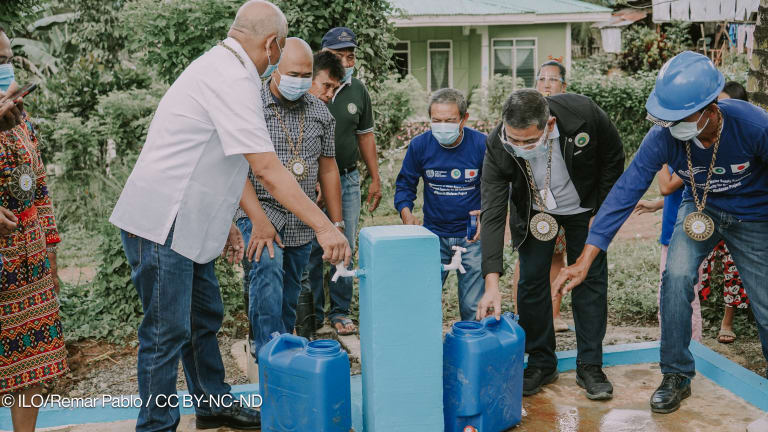Are EU development contracts concentrated in too few hands? New data sheds some light
EU politicians say the European Commission may be giving too many development contracts to a handful of national aid agencies. Data on indirectly managed funds could support that.
In December — in response to concern from members of the European Parliament about how many development contracts were being awarded to a handful of European national development agencies — the European Commission released data detailing the contracts awarded to these bodies between 2010 and 2019. The commission disburses aid funding in two ways: Direct management, where it manages the contract directly with the final recipient, typically through a competitive bidding process; and indirect management, where the EU funds are trusted to an intermediary organization — typically an international organization or bilateral agency — to manage. These indirectly managed funds are harder to track because, while the intermediary is obliged to publish information about the funding received, there is no central system for this. That’s where this new data set fills a gap in knowledge. The disclosed data is still insufficient for a full analysis of development-related awards — in some cases, for example, EU funding going to aid agencies is not disaggregated from funding for other government departments — but it can still tell us something about which of the EU’s bilateral aid agencies are receiving the biggest share of the pie. So which are they? The data set includes €10.2 billion of funding for 76 EU member state institutions and governments. Within that, Devex identified 15 primarily development-focused bilateral agencies, which were awarded €7.6 billion across the 10 years. The French and German bilateral aid agencies easily top the list, with more than €2 billion each for the whole period. In close third position is the German development finance institution, Kreditanstalt für Wiederaufbau, with €1.9 billion. That means these three agencies together received nearly 80% of the total funding awarded by the commission to bilateral aid agencies under indirect management arrangements during this period. Agence Française de Développement The French bilateral development agency managed €2.14 billion of commission funding from 2010-2019, receiving the biggest chunk in 2017 at €521.5 million. Although the data set itself does not identify specific projects, AFD-managed commission programs range from a security and development program in northern Mali under the EU Emergency Trust Fund for Africa to a biodiversity and climate change program in the Pacific. AFD has managed 23 EUTF projects worth €425 million since the fund started in 2015. German development agencies Deutsche Gesellschaft für Internationale Zusammenarbeit, or GIZ, is the key institution in German development cooperation and won €2.1 billion in indirectly managed funds. However, it’s worth noting that KfW received just 10% less than GIZ from 2010 to 2019. Together, they accounted for more than €4 billion. The highest amount won by GIZ in any year was €470 million in 2016; for KfW, it was €475 million in 2017. As with AFD, GIZ is a key implementer of EUTF. It is involved in 38 projects worth over €700 million, though most of the projects have co-implementers. The programs are focused on better migration management, youth training, and job creation. Under one of the most recently-approved projects, GIZ will implement cross-border collaboration in the Horn of Africa region, together with the United Nations Development Programme, with a total budget of €63.9 million. Meanwhile, KfW is one of the top DFIs implementing projects as part of blended finance operations under the European Fund for Sustainable Development, the financing arm of the EU external investment plan. Spanish development agencies Between them, AFD, GIZ, and KfW take the lion’s share of the funding. But a bit lower down the rankings are three Spanish agencies involved in development work. Surprisingly, the one managing the most external aid funding from the commission is the International and Ibero-American Foundation for Administration and Public Policies, or FIIAPP, which received €300 million from 2010 to 2019. This is a third more than the amount managed by the Spanish Agency for International Development Cooperation, or AECID, which received €227 million over the same period. Created in 1998, FIIAPP is a public institution that belongs to the Spanish international cooperation system and focuses on governance and capacity-building projects. Examples of work it is doing with funding from the commission include supporting Central Asian governments on drug reduction policies and contributing to the economic modernization of Cuba. Meanwhile, AECID is managing several EUTF projects, including Energy Access for Host Communities and Refugees in Ethiopia with a budget of €3 million. The Compañía Española de Financiación del Desarrollo, or COFIDES, the Spanish DFI, also received funding from the commission for the first time in 2019, at €19 million. One of the blended finance projects it is leading is the Huruma Fund, which aims to improve access to finance to small or excluded farmers in rural areas of lower-income countries. And last but not least ... Beyond those in the top spots, Agence Belge de Développement, or ENABEL, received €343 million. The British Council has consistently received funding since 2011, rising from €250,000 that year to €65 million in 2019, giving it a total of €224 million for the whole period. The Austrian Development Agency, Lux Development, and Swedish International Development Agency are among the other bilateral aid agencies named in the data set. For access to in-depth analysis, insights, and funding opportunities from over 850+ sources — combined with Devex Pro news content — sign up for Pro Funding or get in touch to learn about our Pro Funding group options.
In December — in response to concern from members of the European Parliament about how many development contracts were being awarded to a handful of European national development agencies — the European Commission released data detailing the contracts awarded to these bodies between 2010 and 2019.
The commission disburses aid funding in two ways: Direct management, where it manages the contract directly with the final recipient, typically through a competitive bidding process; and indirect management, where the EU funds are trusted to an intermediary organization — typically an international organization or bilateral agency — to manage.
These indirectly managed funds are harder to track because, while the intermediary is obliged to publish information about the funding received, there is no central system for this. That’s where this new data set fills a gap in knowledge.
This story is forDevex Promembers
Unlock this story now with a 15-day free trial of Devex Pro.
With a Devex Pro subscription you'll get access to deeper analysis and exclusive insights from our reporters and analysts.
Start my free trialRequest a group subscription Printing articles to share with others is a breach of our terms and conditions and copyright policy. Please use the sharing options on the left side of the article. Devex Pro members may share up to 10 articles per month using the Pro share tool ( ).
Raquel Alcega leads the data research and analysis at Devex, providing advice to organizations on the latest funding and programmatic trends that shape the global development space. She also heads up the news business content strategy and designs internal knowledge management processes. Prior to joining Devex’s Barcelona office, she worked in business development in Washington, D.C., and as a researcher in Russia and Mexico.






